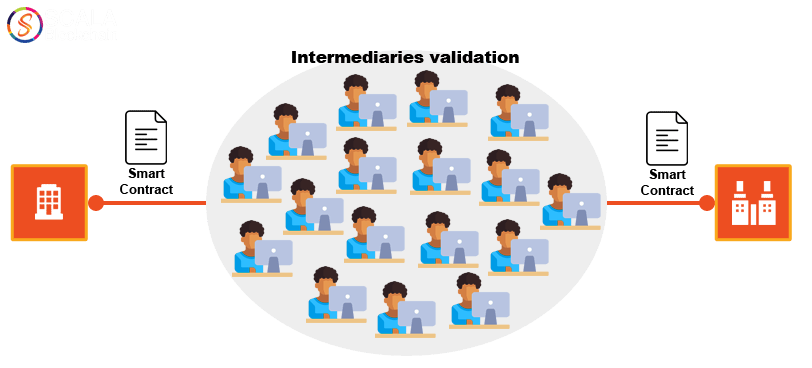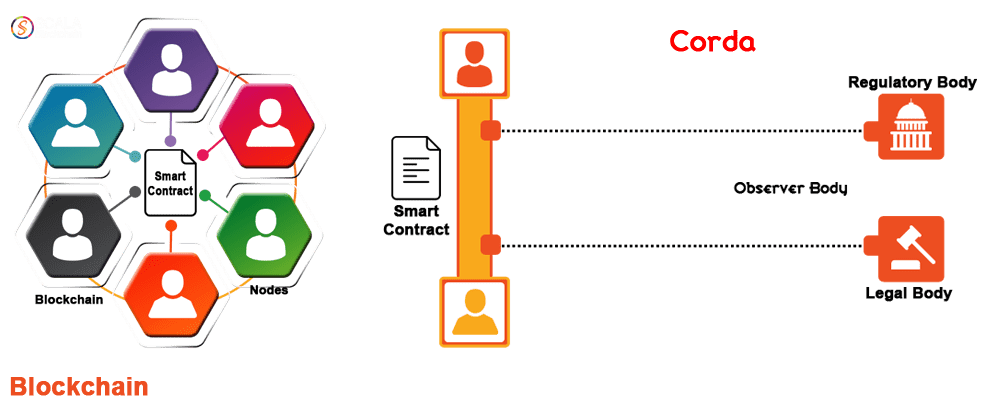Scala Blockchain
Corda Platform for Blockchain
Most things have changed for the better in the last few decades. From the concepts to the way in which a sector works have been computerized. At this day and age we live in a digitized world where most of the data, tasks, and processes are automated and assisted by technology. People are more connected more than ever and computers seem to run everything. Some of the testimonials would be banks and financial organizations that process billions of information a day. With technology come its challenges as well.
 Though it seems to solve many existing problems, some new problems start to emerge. Like for instance the buzz in last few years in tech world has been Blockchain technology as to how immutable and decentralized it is. The problem with technology is sometimes it provides the perfect solution for one but would be totally irrelevant for the other. Here are some of the attributes that Blockchain carried into the market
Though it seems to solve many existing problems, some new problems start to emerge. Like for instance the buzz in last few years in tech world has been Blockchain technology as to how immutable and decentralized it is. The problem with technology is sometimes it provides the perfect solution for one but would be totally irrelevant for the other. Here are some of the attributes that Blockchain carried into the market
- Distribution and Decentralization are core concepts
- Innovative and a continuous learning entity
- Enables smart contracts to cut out the middleman in many industry scenarios
- Embodies the definition of security
- Streamlines process like financial transactions
- Immutable record maintenance
But, then arose the issue of speed and scalability. Though it’s too early to judge blockchain on those gaps, early adopters of this remarkable technology are finding it difficult to keep. Once again it was banks and financial sectors that were the first few industries to adopt the new blockchain technology closely followed by the supply chain industry. With the advent and the success of Bitcoin, Altcoins and ICO’s many more industries have started taking notice of this.
What is Corda?
Very much similar to blockchain, Corda is a distributed ledger platform designed to record, manage and automate contract based legal agreements between two or more parties. Well known for its application in business deals. Targeted towards the world’s largest financial institutions, but potential for application exceeds beyond that. It offers a unique approach to privacy, security, and takes care of the scalability issues that Dapps face.
How Corda works?
As in Blockchain which embodies the Distributed Ledger Technology (DLT), the data are stored in all the nodes in the blockchain making it highly secure. This means that an individual or any entity outside the block can never change the data for their own agenda. This makes it highly secure but at the same time raises the issue of the number of files and the space it takes up.
 For instance, If in a blockchain network there are ten nodes and share twenty documents of data, then these twenty documents would be stored repeatedly as a new set of files in each node. Each time the data is updated it gets saved as a completely new set of file with hash to the previous block. That’s a lot of data and space occupied.
For instance, If in a blockchain network there are ten nodes and share twenty documents of data, then these twenty documents would be stored repeatedly as a new set of files in each node. Each time the data is updated it gets saved as a completely new set of file with hash to the previous block. That’s a lot of data and space occupied.
Smart contracts play a vital role in blockchain, i.e. the contract would be transparent and accessible by everyone in the block. But the main difference with Corda, is that the smart contract can be permission based. Only the two or more parties involved in the transaction would have access to the smart contract. Also with the consensus of the parties involved, a regulatory or a legal body can be given access and brought into the network as an observer to verify the contract.
Highlights
Smart contracts in Corda are executed taking into account the following features
- Regulating and streamlining the workflow between decentralized firms
- Recording and managing the evolution of financial agreements and other shared data between two or more identifiable parties in a way that is grounded in existing legal constructs and compatible with existing and emerging regulation
- Inclusion of supervisory and regulatory nodes just as observers
- Consensus algorithms and levels are between two firms involved and not global
- Access of the data within the agreement is only limited and entitled or logically privileged to the permissioned parties involved
- Acts as a bridging between the usual hard contract with mart contracts by recording the links
- Validation of the transaction solely between the two parties involved
